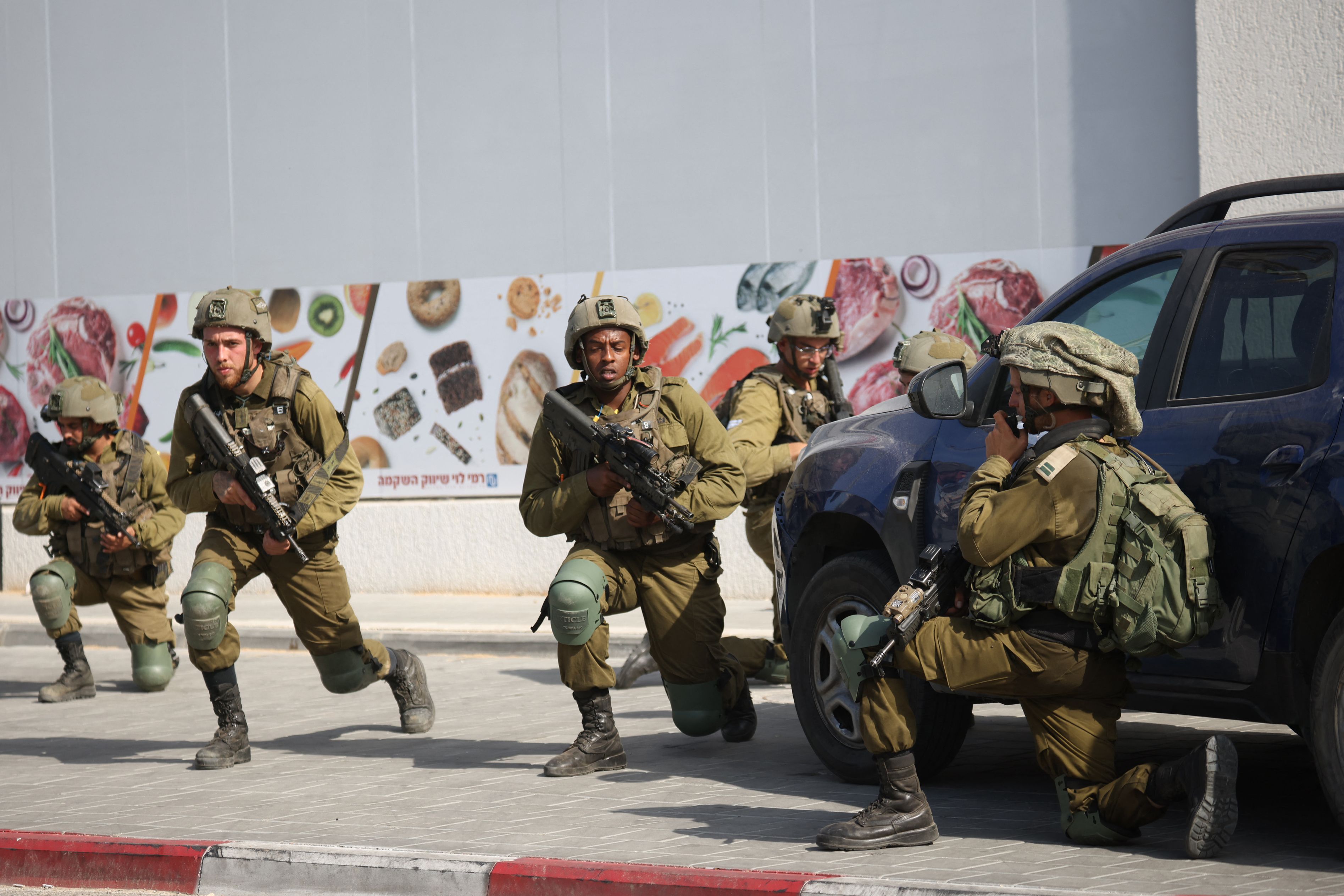Hours after Hamas suddenly launched a sweeping land, sea and air surprise attack on Israel, the Israel Defense Forces (IDF) are still battling with Palestinian fighters, with an unknown number of casualties believed to be mounting.
The sudden assault began early Saturday, a Jewish holiday, as Hamas fired thousands of rockets against Israel and reportedly sent fighters by land and sea into the country in a comprehensive operation it declared “Al-Aqsa Flood” after the revered holy site in disputed East Jerusalem.
As the IDF scrambled to respond to hostilities on multiple fronts, Israeli Prime Minister Benjamin Netanyahu declared his country was “at war.” The IDF retaliation has been named “Sword of Iron” and includes airstrikes against Hamas and another Palestinian group, Islamic Jihad, in the Gaza Strip.
“We are fighting in 22 locations,” IDF spokesperson Rear Admiral Daniel Hagari said in a briefing shared with Newsweek. “There is no community in Southern Israel where we do not have forces, in all the towns. There are communities that have been rid of terrorists, but we want to finish additional scans of the area before declaring so.”
Hagari said that, earlier, “dozens of terrorists infiltrated on foot” in “a large number of locations,” in addition to a naval landing at the southern Israel kibbutz of Zikim, and numerous security fence breaches.
Now, he stated, “there are hostage situations” and “live fire fights” in Ofakim and Beeri, where Israeli special forces and senior commanders are present.
Also, “there are deaths—including deaths of IDF soldiers,” Hagari added, “when we have all the numbers we will give them.”
The number of active fronts and locations of the hostage situations were also confirmed by IDF spokesperson Lieutenant Colonel Richard Hecht. He also did not provide an exact number of casualties, but said the figure was “substantial.”
Responding to Newsweek‘s question, Hecht stated that Hamas was believed to still have a “massive” amount of rockets in store, so further strikes were expected, such as a more recent salvo that targeted Tel Aviv.
Israeli health officials have reported on the deaths of at least 250 Israelis since the fighting broke out, while health officials in Gaza recorded at least 232 deaths as a result of Israeli strikes.
In addition to the Israeli air response, Hagari said that the IDF has begun a “wide mobilization of reserves,” bringing four divisions to Gaza to join 31 regular battalions already active on the frontline with the Palestinian enclave and across southern Israel.
“We will do a very sharp and thorough review,” Hagari said. “We are currently busy regaining control of the area, striking broadly and especially taking care of the area around the Gaza Strip.”
“The citizens of the State of Israel are require great resilience, with an emphasis on the residents of the Gaza Strip,” he added. “These are difficult hours of fighting— but at the end we will reach full security in the Gaza Strip.”
Hagari also noted that the IDF is on “high alert” across its northern borders with Lebanon and Syria, with which Israel remains in a technical state of war. In previous flare-ups, rockets have been fired against Israel from these fronts and, in Lebanon, the powerful Hezbollah has expressed support for the Palestinian attack.
Hecht too said the IDF was “prepared for an escalation on the north.” He also pointed to the suspected involvement of Iran, which backs Hezbollah and is supportive of Hamas as well.
In a statement, Hezbollah said it was “in direct contact with the leadership of the Palestinian resistance at home and abroad and conducts with it a continuous assessment of events and the progress of operations.”
Reached for comment, a Hamas spokesperson shared with Newsweek the latest remarks by the group’s political chief, Ismail Haniyeh, who said the operation came in response to Israeli abuses against Palestinians in the Gaza Strip, the West Bank and Jerusalem.
“We warned the whole world, with this fascist government that unleashed the settlers to wreak havoc in Al-Aqsa Mosque and in Jerusalem,” Haniyeh said. “And we told them not to play with fire, and not to cross the red line, but they deafened their ears and blinded their eyes.”
The ongoing conflict comes amid a sharp uptick in Israeli-Palestinian violence in the West Bank, where the IDF has stepped up raids against suspected militants. It also comes at a fluid moment for global geopolitics as a growing number of Arab countries pursue reconciliation with both Israel and its top foe, Iran, and a significant amount of attention is fixated on the ongoing Russia-Ukraine war.
Haniyeh claimed these events gave Israeli leadership the notion that they could achieve a victory in the decades-long Israeli-Palestinian conflict.
“The occupation believed that the surrounding environment, the calmness of the Arab and Islamic peoples, and the world’s preoccupation with the Ukrainian-Russian war, meant that the time had come to resolve the battle of Jerusalem and Al-Aqsa,” Haniyeh said, going on to cite the Quran.
“But as God Almighty said,” he added. “‘You did not think that they would emerge, and they thought that their fortresses would protect them from God.'”
Newsweek has reached out to Hezbollah and the Iranian Mission to the United Nations for comment, as well as to the IDF for further details.

